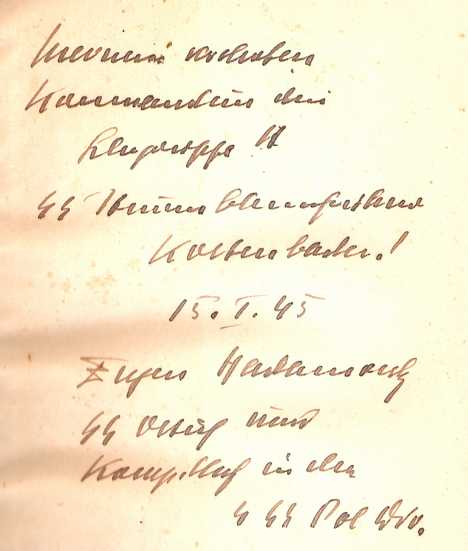


Background: Eugen Hadamovsky served the Nazi Party in a variety of positions. He is most noted for his 1933 book Propaganda und nationale Macht, This is a brief article he wrote in 1935 for the party’s monthly for propagandists. It’s not a particularly good essay (one gets the idea that he wrote it hurriedly), but given my interest in Hadamovsky I’m adding it to the GPA. For more information, see a 1943 biographical sketch
The source: Eugen Hadamovsky, “Drei Prinzipien der Propaganda,” Unser Wille und Weg, 5 (1935), pp. 89-90.
The basic principles of all propaganda are always the same, whether one is working with the press, radio, or some other instrument. Dr. Goebbels once said: “There is only one truth. Either we are lying and the others are telling the truth, or we are speaking the truth and everyone else is lying.” From these words of Dr, Goebbels, one can conclude that one can never make persuasive propaganda if one is not oneself persuaded of the truth of the statements and views that one is representing.
The principle of self-persuasion is bound to the principle of absolute truthfulness. That is the double requirement for successful propaganda; one must have confidence in oneself, but only through truthfulness can one win the confidence of the people. It is a general human principle: no one likes to be lied to. This [truthfulness], too, is a general principle of propaganda. A second principle of propaganda is to focus on what is essential. Liberal propaganda varied greatly, and was, therefore, never able to lead to real change. Liberalism said: “One must look at things from all perspectives.” We National Socialists, however, saw that one can never see a thing from all sides. Such objectivity never existed in the sciences, much less in normal human life. The propagandist, therefore, can never deal with the sum total of everything in people’s minds, because each person is different. Levels of attention vary, and one cannot make everyone equally conscious of something. A further principle of propaganda results from this, the principle of the essential. The propagandist must seek our the essential from thousands of things, without departing in any way from the truth. He is responsible to choose. He must always follow absolutely the principle of truthfulness.
A further principle of propaganda is the principle of national objectivity. We Germans to some extent are notorious for our objectivity; for a long time we believed in absolute facts and objectivity — remember back to our war propaganda. That is no longer scientifically tenable. We know today that there is no objective description of any event. We see examples in eyewitness testimony, etc. One must, therefore, say that there is no absolute objectivity; it is always limited by a certain point of view. One can see things consistently as a communist, but one can also see things consistently from a different perspective. That is “objectivity within an attitudinal framework.” We National Socialists understand objectivity as an attitude based on a national foundation, and therefore this principle of propaganda is the principle of national objectivity. That is, we make propaganda not from the standpoint of a Frenchman, an Englishman, a worker, an office worker, or a farmer, but rather only from the standpoint that obligates all of us: the standpoint of the German nation!

Hadamovsky’s signature on a copy of his book Propaganda und nationale Macht inscribed to SS-Sturmbannführer Erich Kostenbader on 15 January 1945, six weeks before his death.
Page copyright © 2021 by Randall Bytwerk. No unauthorized reproduction. My e-mail address is available on the FAQ page.
Go to the 1933-1945 Page.
Go to the German Propaganda Home Page.